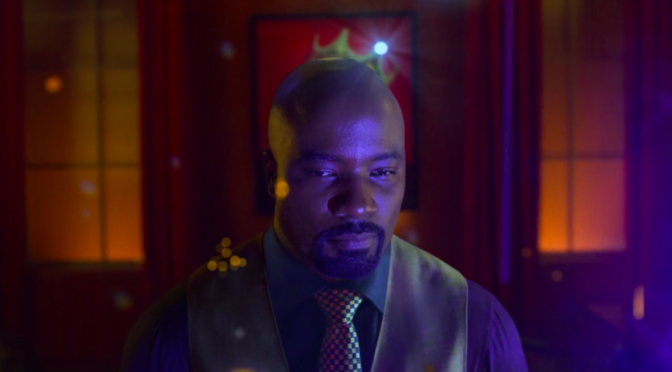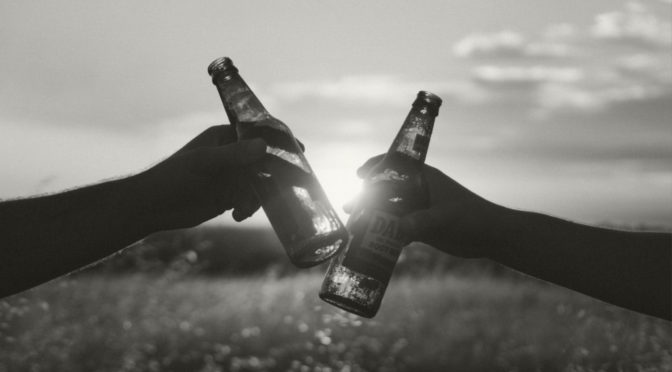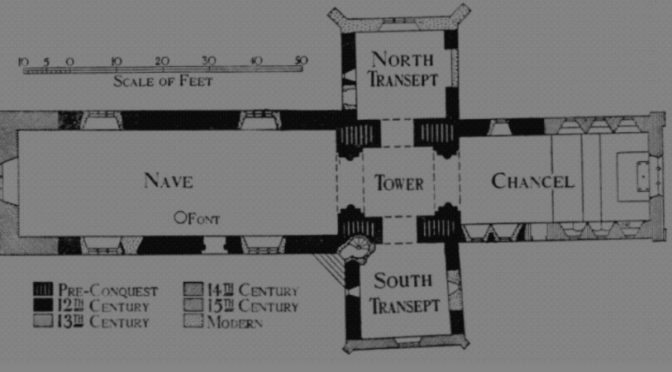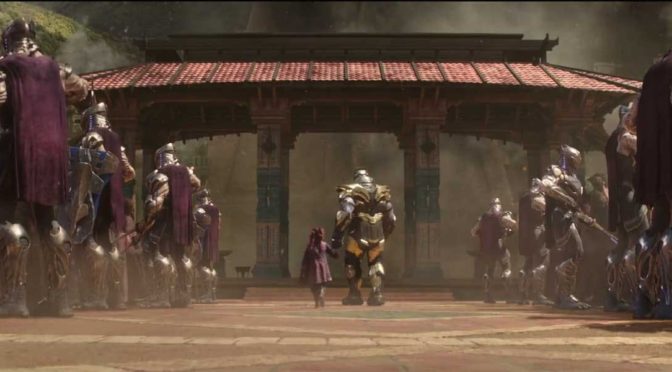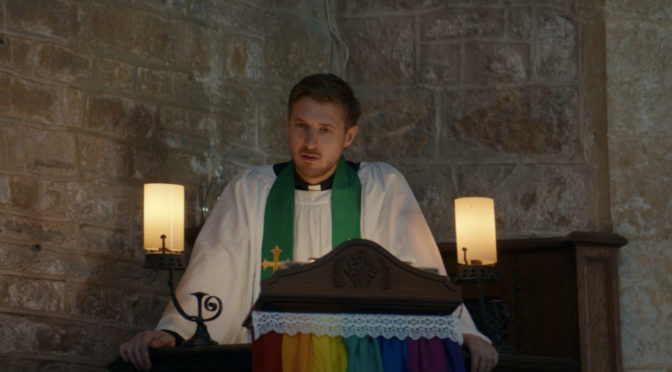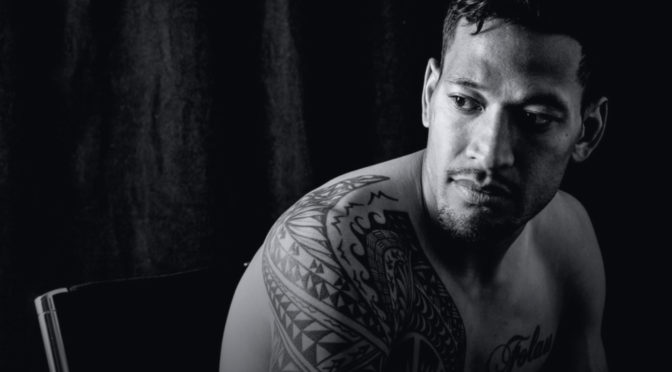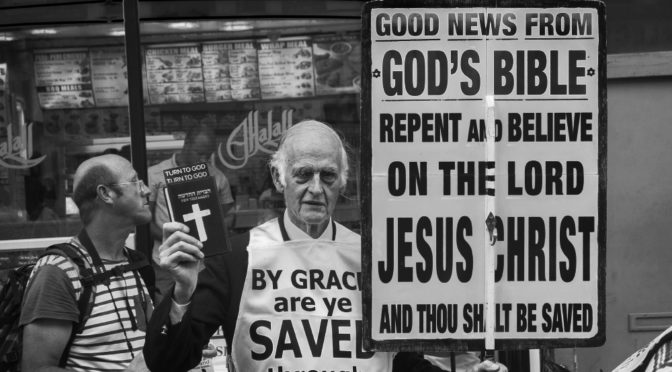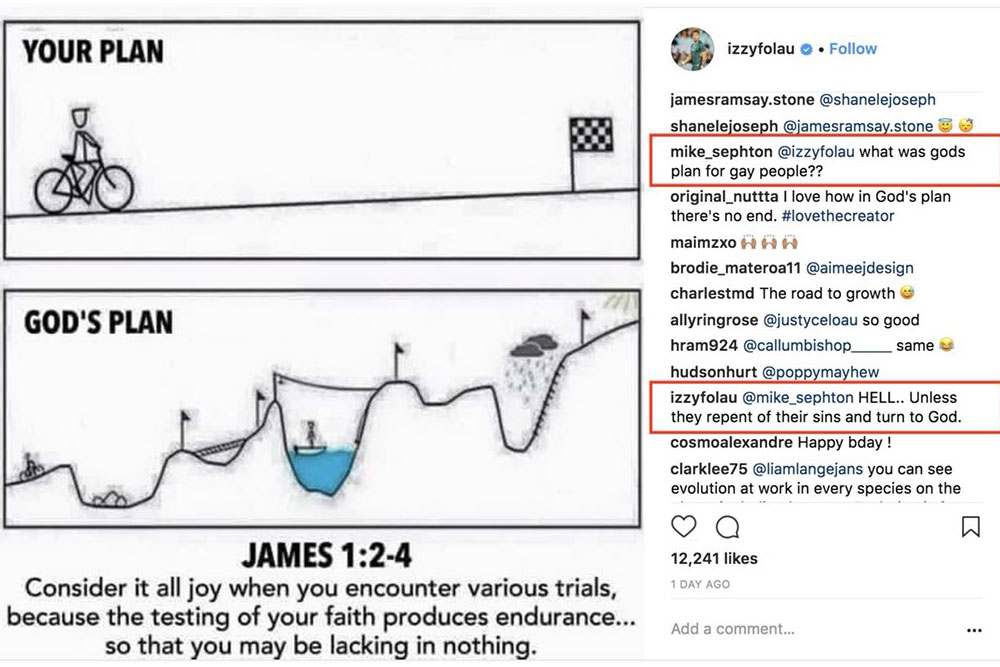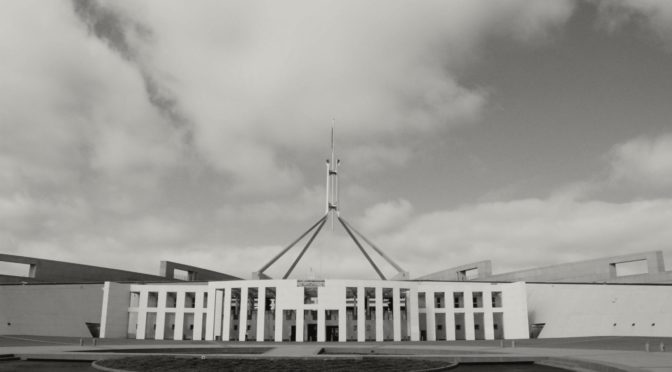“Everybody’s talking about Luke Cage like he’s Jesus. You’ve got magazines calling him the bullet proof black man with Barack’s easy smile, Martin’s charm, and Malcolm’s forthright swagger… Harlem’s worship of Luke Cage has reached golden calf proportions. Luke Cage is soul brother number one. But I want you to ask yourself one thing. Luke Cage. Who is he really? Does he serve the Lord, or does he serve himself? … Luke Cage is nothing but a man, and there’s a reason we don’t worship men because we’re weak, subject to temptation, ego, vainglorious, spiteful, oh yes, Lord knows, we are spiteful. Bulletproof skin doesn’t change nature.” — Rev Lucas, Luke Cage, Season 2, Episode 1.
Almost everybody in Luke Cage season 2 is angry. The whole season is an exploration of just how destructive the spiteful part of human nature is; and just how deeply rooted the cycle of anger and vengeance is in our psyche and how destructive it is when you can’t let go; when you can’t forgive. Anger doesn’t liberate; it captivates. There’s a sub-thread about just how hard it is to bring forgiveness and reconciliation into an angry environment too; but also just how redemptive breaking the cycle can be.
Luke Cage is an interesting exploration of a superhero informed by a ‘liberation theology’ styled-Jesus. The comparisons to Jesus in Luke Cage aren’t subtle like in many other stories set in the backdrop of the western world, they’re overt. This was true in season one, it’s contained in the origin story of Carl Lucas’ choice of ‘Luke Cage’ as a name — it’s a reference to the Gospel of Luke and the promise that Jesus came to liberate captives (Luke 4); the opening words of season two show there’s no signs of the messianic comparisons abating. We might be keen to distance ourselves from belief in the supernatural these days, but there’s no escaping the way the story of the Bible, and its prescient diagnosis of the human heart, has shaped our narratives. By the end of the season Luke Cage is Harlem’s Messiah — its ‘anointed king’ — the question is what sort of king he’ll be, and what part of its soul it’ll cost him.
“The preacher’s son. Even when you’re ugly, you are regal. Harlem’s gonna need a king. I’m glad it’s you.” — Mariah
The season picks up somewhere after the events of The Defenders, Luke is back pounding the streets of Harlem. Jessica Jones is off enjoying her season 2 hijinks (enjoying is a strong word). Danny Rand is patrolling other boroughs of New York as the Immortal Iron Fist (though he makes a fun cameo). Matt Murdock… well… the cut scene at the end of The Defenders has him in a monastery somewhere.
There’s a new battle for the streets of Harlem; a three-way fight (with a few extra parties like the police, and some rival gangsters thrown in the mix) all motivated by some form of anger, all allowing the shows writers to explore various forms of injustice — from Mariah Stokes who carries anger at past sexual abuse and a messed up family background which complicates her relationship with her daughter Tilda, to Bushmaster, who has returned from the Caribbean hell-bent on gaining revenge over the Stokes family because their wealth is built from the dispossession and murder of his ancestors, and Luke Cage who’s angry about his father, angry and angry about what Harlem’s criminal element costs his people.
The music in this season is sensational — Luke typically fights with ear buds in place breaking bones to the beat of various hip-hop tracks, Bushmaster’s attempts to conquer turf are accompanied by reggae, while Mariah’s plotting plays out against a sonic landscape of her club Harlem’s Paradise — typically blues. These two songs from Christone ‘Kingfish’ Ingram were spectacular.
But, music aside, the show is about anger and its power — anger as motivator — and how much it grips and distorts and destroys when our hearts, our nature, are impure… no matter how pure we think our hearts are, Rev. Cage is right, bulletproof skin doesn’t change a man’s nature. The problem for Luke is that he’s started to believe it’s his anger, not his strength and bulletproof skin, that is the source of his power. There’s a battle raging for his soul — and with it the soul of his kingdom, Harlem.
I’m a man, ok, full fledged. My anger is real. But if I can use that anger for intimidation and fear, to do work, then so be it. If I have to speak the language of those who would do others harm to make them stop, then so be it. — Luke Cage
The problem is that this ‘turn’, this ‘messianic vision’ can’t even bring those closest to him on board; and Luke has to decide if he’s in life for love and relationships, especially with Claire, or if he has bigger fish to fry…
“He’s going down a dark path, one that I’m not sure I can follow. He’s angry. He’s lost his purpose… he’s in a place where I can’t help him because I don’t know how…” — Claire, Season 2, Episode 3
The problem set up early in the series is whether or not this embracing of the darkness is going to leave Luke indistinguishable from those he seeks to save…
“Sometimes you have to step on a cockroach, I get it. But when you enjoy the stomping? What’s next? You become an exterminator?” — Claire
And while Luke is grappling with this identity crisis, the season’s anti-hero, Bushmaster is a picture of the fully-fledged embrace of darkness as he goes toe to toe with Mariah for control of the family — darkness against darkness, forcing Mariah, the carry-over villain from season one to raise the bar as she targets Bushmaster’s family; a family who had been urging him to turn his back on the vicious cycle of strength pitted against strength; violence against violence; an ‘eye for an eye’… at one point an abducted family member of Bushmaster’s, Anansi, stares down Mariah and articulates not just the war for Bushmaster’s heart, but for Luke’s.
“Anansi: I didn’t want him to destroy you the way the Stokes destroyed his family.
But now I see you with my own two eyes, and I understand the temptation.
Your darkness matching his.
You deserve all the brimstone he’s gonna bring upon you.
Mariah: Where is he?
Anansi: I don’t know. And I wouldn’t tell you even if I did. But I’ll tell you like I tell him. When one seek vengeance, he must dig two graves.
Mariah: That’s not enough holes for me.” — Episode 10
Luke’s soul is up for grabs in this series, and by the end, we’re not sure whether or not the darkness has taken over… is he Mariah’s heir a new angry oppressor, or a liberator? Is he a hero or a gangster?
“You really are Luke Corleone, aren’t you?” — D-Dub (President of Luke’s fan club)
There’s a great visual homage here, continuing the Godfather reference, where the newly enthroned Luke Cage is greeted at his desk by his new crew and Detective Misty Knight, who has placed such hope in him watches through a closing door.
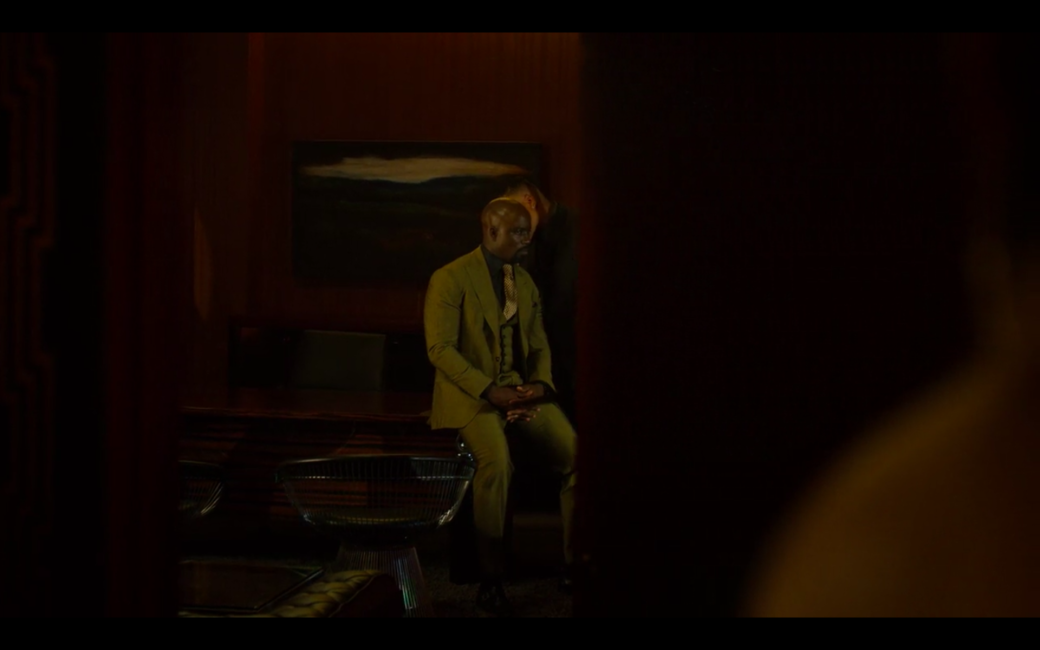
Mariah (in a flashback, via her lawyer): You know the story of the Sirens? The beauty of their voices compelled men off course to crash against the rocks. This club will be his siren. He’ll be lulled by its song, lulled by so-called greatness.
Luke: She really said that?
Ben Donovan (the lawyer): “You can’t rule no kingdom from a barbershop,” is what she said to me.
Mariah: The preacher’s son will think he can use the roost to change things, to control it. But in the end it will change him.
There’s another great visual moment in the final episode where it appears Mariah’s prophecy might have bean realised; back in season 1, gangster Cornell ‘Cottonmouth’ Stokes had a giant portrait of a crowned Biggie Smalls hanging on the wall in Harlem’s Paradise. Mariah replaced it, but Luke restored it to pride of place, mostly so these two shots could be framed to, perhaps, close the circle…
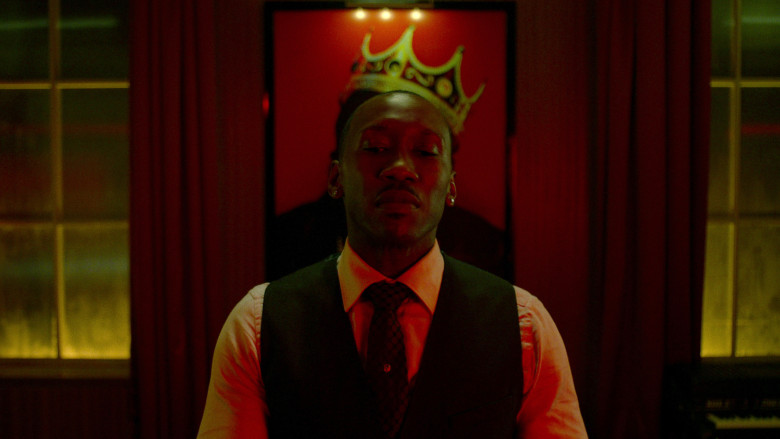
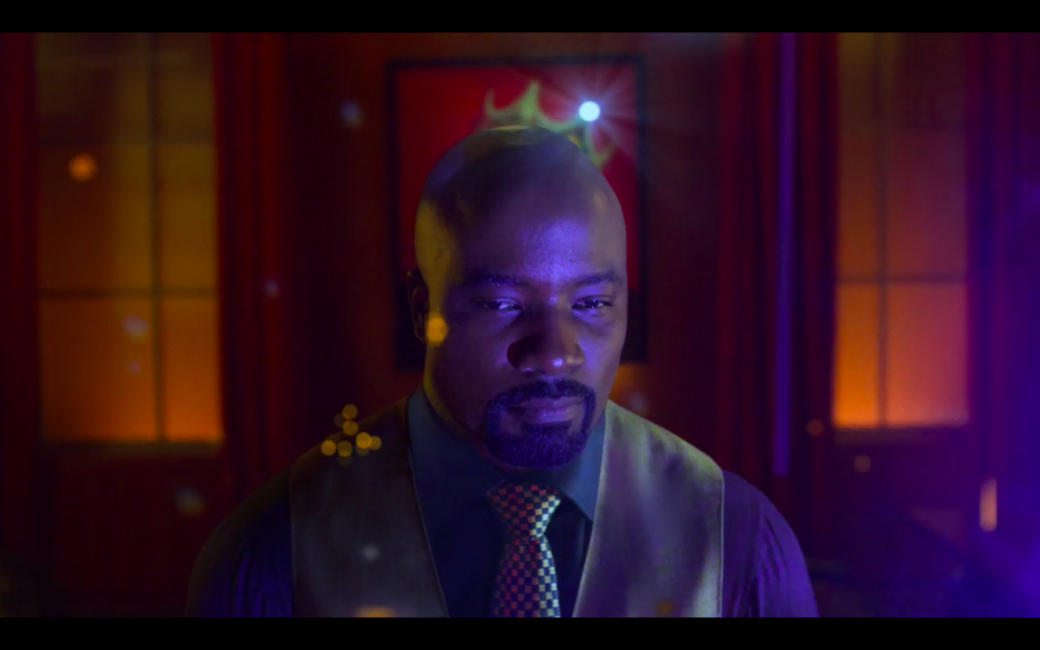
The things we own end up owning us… could it be that Luke Cage is a ‘golden calf’ after all? Not a saviour of Harlem but an oppressor? Could it be that Luke’s dad was right when he said “there’s a reason we don’t worship men because we’re weak, subject to temptation, ego, vainglorious, spiteful, oh yes, Lord knows, we are spiteful. Bulletproof skin doesn’t change nature.”
The war for Luke’s soul, the war for the heart of the ‘saviour king’ of Harlem, is still on in earnest, and with it a war for Harlem’s future… all the visual clues suggest the battle is raging, and that Carl ‘Luke Cage’ Lucas might have lost himself. The closing words, a flashback to a conversation Luke had with his father as they were reconciled, offer, perhaps, a note of hope that his soul might not totally be lost; that Luke might yet face a pressure test and be prepared to walk away from seeing anger as his power.
Your strength is from God, Carl.
I have no doubt in my mind about that.
But with that kind of power comes its share of pain.
Science? Magic? God? That power flows from within. From inside.
What comes out when that pressure is heaviest? That’s the real magic.
That’s what defines being a man.
That’s what defines being a hero. — Rev. Lucas
Luke Cage’s preacher dad has the first and last words this season. In my review of season 1 of Luke Cage I suggested that Luke Cage’s approach to messianic heroism was shaped, perhaps, by the sort of Black Liberation Theology that uses Luke 4 the way he does; the sort founded by theologian James Cone. Here’s a quote from A Black Theology of Liberation.
“In the New Testament, the theme of liberation is reaffirmed by Jesus himself. The conflict with Satan and the powers of this world, the condemnation of the rich, the insistence that the kingdom of God is for the poor, and the locating of his ministry among the poor–these and other features of the career of Jesus show that his work was directed to the oppressed for the purpose of their liberation. To suggest that he was speaking of a “spiritual” liberation fails to take seriously Jesus’ thoroughly Hebrew view of human nature. Entering into the kingdom of God means that Jesus himself becomes the ultimate loyalty of humanity, for he is the kingdom. This view of existence in the world has far reaching implications for economic, political, and social institutions. They can no longer have ultimate claim on human life; human beings are liberated and thus free to rebel against all powers that threaten human life. That is what Jesus had in mind when he said:
The Spirit of the Lord is upon me, because he has anointed me to preach good news to the poor. He has sent me to proclaim release to the captives and recovering of sight to the blind, to set at liberty those who are oppressed, to proclaim the acceptable year of the Lord (Luke 4:18-19).”
The sort of rebellion against the powers he talks about here involves anger and, at times, according to Cone, permits violence. He writes some exceptionally provocative things about the status quo and racism, and there’s something about theology done from the black perspective that really does ‘re-embody’ Jesus and his teaching in a way that institutionalised, white, Christianity just doesn’t comprehend, let alone practice. He argues that if theology is neutral about oppression and oppressors, it is as bad as it being used to justify oppression, and this should be a challenge that the institutional church in the west, including in Australia, hears on issues of race…
The challenge Luke Cage leaves us grappling with a bit when it comes to issues of race and liberation, alongside Cone’s theology, is what place anger and violence have in solving the problem. Can you embrace the tools of the enemy without becoming the enemy? Is any human heart — even a heart moving from oppression, on behalf of the oppressed, ever avoid becoming an oppressor when handed power?
Cone recognised that anger alone would leave his movement ‘one armed’; that unfettered, it would lead to the sort of destruction Cage faces.
“Anger and humour are like the left and right arm. They complement each other. Anger empowers the poor to declare their uncompromising opposition to oppression, and humour prevents them from being consumed by their fury.” — James Cone
Luke needs to rediscover laughter; at least from Cone’s perspective. And there’s surely something in that, but perhaps the deeper problem Luke Cage presents via Luke’s apparent descent into the abyss is that violence begets violence, and angry oppressors rising up creates new oppressors; here is where someone like Martin Luther King Jr is a voice of resistance against a Christian theology of Luke Cage; an application of Luke 4, that includes violence. Less this become to reductionist, it’s worth pointing out that Cone does have a significant place for the cross in his theology; to take up one’s cross is to enter the ghetto alongside the oppressed, but the movement from that position is one of rising up in a sort of judgment against the oppressor (much like Luke Cage does in the series once his powers are secured and he re-enters Harlem). Here’s King on the problems of violence:
“My study of Gandhi convinced me that true pacifism is not nonresistance to evil, but nonviolence resistance to evil. Between the two positions, there is a world of difference. Gandhi resisted evil with as much vigour and power as the violence resister, but he resisted with love instead of hate. True pacifism is not unrealistic submission to evil power, as Niebuhr contends. It is rather a courageous confrontation of evil by the power of love, in the faith that it is better to be the recipient of violence than the inflicter of it, since the latter only multiplies the existence of violence and bitterness in the universe, while the former may develop a sense of shame in the opponent, and thereby bring about a transformation and change of heart.” — Martin Luther King Jr, Stride Toward Freedom
Luke Cage as a text, and Cone and King as theologians have lots to teach us particularly on the issue of race. I think Cone is right about the problems with theology from institutional Christianity that upholds, or doesn’t challenge, status quos, and some of the critique of non-violence and the ‘violence’ of institutions built on the back of historic violence in his words at this link are worth sitting with, but I think King is closer to the solution when it comes to how those marginalised by our institutions should respond in ‘rebellion’… there’s obvious dangers with someone educated in such institutions, and employed by one — as I am — who is also white — as I am — prescribing solutions for those kept on the outer (not by ‘policy’ — our institutions don’t preclude indigenous participation — but by culture and so by practice — they do take shapes and involve requirements and even just behaviours and norms that we’ve ‘baptised’ that serve as barriers).
There’s a real danger that theology that doesn’t listen to voices from the margins is not Christian, but ‘Babylonian’ — that we prop up worldly status quos not intentionally but because we are ignorant; because we are not hearing the voices and experiences of those who are oppressed not just by worldly forces but our failure to speak and act against them. My own experience of listening to indigenous Christian leaders here in Australia over the last few years has been to be confronted with my ignorance of the indigenous experience of life in Australia; it has been to confront how I’ve, in substantial ways, benefited from being white in a white system and how this benefit ultimately comes at the expense of those peoples dispossessed by European settlement. It has involved being confronted with truths about Australia that are often white-washed from school curriculums. Try, for starters, reading this utterly confronting account of massacres of indigenous peoples in South Australia and the Northern Territory — for bonus points, try doing this as I did, having driven through the areas it speaks of a few weeks before where you can’t help but observe the economic gap between indigenous Australians in these areas and the white community both there and on the coasts. Then check out this project mapping massacres around the country. This stuff is enough to make me angry — imagine if I’d been dispossessed and impoverished just how angry I (or you) should be… then chuck a bulletproof and powerful hero into the mix there and tell that hero how to live, or what to do… I read Richard Flanagan’s recent speech calling for the re-imagination of Australia, and an Australian story that acknowledges this history and moves to something better, and it mentions the story of Jandamarra, a resistance fighter in the Kimberly region who was hunted by the colonial police. A hero for a time in Australia’s history where to be black meant to be shot at — much as in Luke Cage‘s harlem, and in the United States in the age of #blacklivesmatter — Jandamarra was thought to be bulletproof (it was believed he could dissolve his body so that bullets would pass through where he stood). Flanagan said:
“When the colonial police were hunting down the great Bunuba resistance fighter Jandamarra, they came to believe that he was, as the Bunuba said, a magic man. Many white settlers came to believe Jandamarra could fly and even police reports described bullets passing through his body. The Bunuba believed that a magic man could only be killed by another magic man, and so police brought one down from the territory and it was he who killed Jandamarra.
But who really won?
To defeat the Bunuba the whites had to enter their Dreaming, and accept their beliefs as the truth of the Kimberley. And in this way the story of the frontier is a story of birth as well as of killing, of values and mentalities changing as much as it is also of segregation, oppression and violence. If we can as a nation learn and understand some of these things we can also appreciate the second story which is as transcendent as the first is tragic, and that is a different story of the past, a story of glory.
This is a challenge outside the church, for our approach to our shared life to be shaped by listening to those voices typically excluded from the mix; but it’s also a challenge for the church. And there’s never been a better time for us, as an institution in our culture, to take up this challenge. We’re experiencing our own marginalisation in the culture — finally realising what it looks like not to have a seat at the table. We can approach this new reality in two ways — we could fight, we could get angry, we could look for our own bulletproof heroes (who’ll probably write columns in the Spectator), or we can do some self-assessment from this new perspective and consider what voices in our culture have been excluded from the table in part by us and start listening to them to hear how they’ve approached being marginalised while being followers of Jesus, to figure out how to chart an heroic way forward for the church, and perhaps for our country. We could start participating in public life as Christians not for our own interest, or to maintain or protect our place in society, but for the interest of these other groups. We don’t need to be bulletproof to be heroic; we just need to have our character revealed under pressure — and to reveal the character of Jesus, as described by Martin Luther King — as we’re marginalised would be a fine start.
There’s no doubt a few people who, if they’ve bothered reading this far, will suggest this, what I’m suggesting, is a path to theological liberalism, to letting go of the Gospel — but that’s not it. It’s very easy to dismiss voices from the margins, from outside our ‘orthodox’ institutions as liberal as a way of not listening or reforming (just consider how the Catholic Church responded to the reformers). It’s very easy to assume that our own experience of the world is normal and that we are ‘colourblind’ and so able to see Jesus truly, detached from our own subjectivity. Acknowledging our possible bias and the problem with institutions that stagnate somewhere near the centre of the status quo isn’t a call to liberalism.
It’s a challenge to let go of those places where we’ve brought the powers of this world into our approach to following King Jesus such that we can’t always tell the difference between Jesus and Caesar.
It’s a suggestion that our faithful brothers and sisters who aren’t part of our institutions be it voices from Australia, or Christians from other countries and cultures who already occupy the margins, might have some prophetic critiques of our practices and beliefs… That this might be akin to listening to the voices of faithful same sex attracted brothers and sisters, those committed to a traditional sexual ethic, when they critique our institutional practices (idolatry) of family and marriage. That these marginal voices are precisely the ones we should turn to in a world that idolises sex, marriage, and family because they are not part of that ‘status quo…
It’s a challenge to keep reforming and to realise that reform comes from the edge of institutions (ala the other Martin Luther) not from the centres of power. The voices that might sometimes be dismissed for being too angry…
It’s a challenge to have those voices and those experiences help us re-imagine the story of Jesus, without our particular cultural blinkers, and so re-image Jesus in how we live.
This is why I continue to be blown away by my indigenous Christian friends who aren’t consumed by anger, but rather continue to offer hope and invitation centred on re-making and re-imagining an Australia that deals with this past, but also looks to a future, particularly a future shaped by the cross of Jesus. If we want to be part of that future, as a church, perhaps it’s time we start deliberately carving out space to hear these voices rather than allowing our educational and church practices to keep maintaining the status quo.
